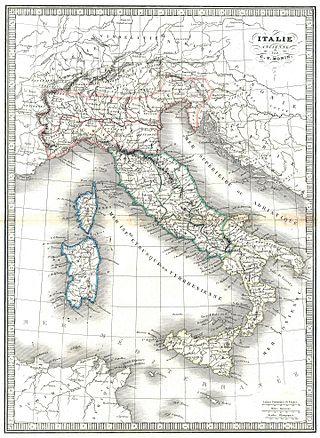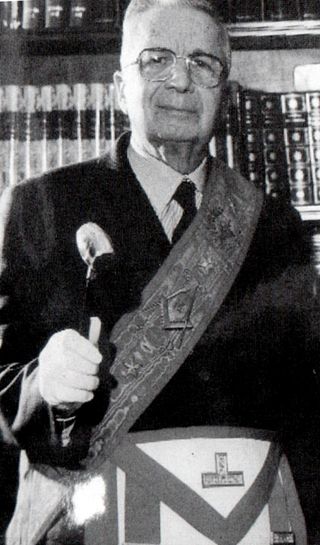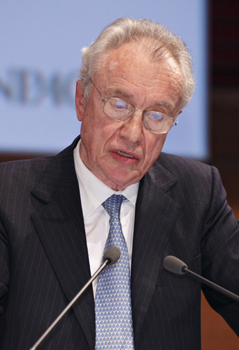
Roberto Calvi was an Italian banker, dubbed "God's Banker" by the press because of his close business dealings with the Holy See. He was a native of Milan and was chairman of Banco Ambrosiano, which collapsed in one of Italy's biggest political scandals.

Propaganda Due was a Masonic lodge, founded in 1877, within the tradition of Continental Freemasonry and under the authority of Grand Orient of Italy. Its Masonic charter was withdrawn in 1976, and it was transformed by Worshipful Master Licio Gelli into an international, illegal, clandestine, anti-communist, anti-Soviet, anti-Marxist, and radical right criminal organization and secret society operating in contravention of Article 18 of the Constitution of Italy that banned all such secret associations. Licio Gelli continued to operate the unaffiliated lodge from 1976 to 1984. P2 was implicated in numerous Italian crimes and mysteries, including the collapse of the Holy See-affiliated Banco Ambrosiano, the contract killings of journalist Carmine Pecorelli and mobbed-up bank president Roberto Calvi, and political corruption cases within the nationwide Tangentopoli bribery scandal. P2 came to light through the investigations into the collapse of Michele Sindona's financial empire.

Licio Gelli was an Italian Freemason, criminal and terrorist. A Fascist volunteer in his youth, he is chiefly known for his role in the Banco Ambrosiano scandal. He was revealed in 1981 as being the Venerable Master of the clandestine masonic lodge Propaganda Due (P2).

The Institute for the Works of Religion, commonly known as the Vatican Bank, is a financial institution that is situated inside Vatican City and run by a Board of Superintendence, which reports to a Commission of Cardinals and the Pope. It is not a private bank, as there are no owners or shareholders; it has been established in the form of a juridical canonical foundation, pursuant to its statutes. Since 9 July 2014, its president is Jean-Baptiste de Franssu. The IOR is regulated by the Vatican's financial supervisory body ASIF.
Paul Casimir Marcinkus was an American archbishop of the Catholic Church and president of the Institute for the Works of Religion, commonly known as the Vatican Bank, from 1971 to 1989.

Beniamino "Nino" Andreatta was an Italian economist and politician. He was a member of Christian Democrat, and one of the founders of the Italian People's Party in 1994 and of the Olive Tree coalition in 1996.

Giuseppe "Pippo" Calò is an Italian mobster and member of the Sicilian Mafia in Porta Nuova. He was referred to as the cassiere di Cosa Nostra because he was heavily involved in the financial side of organized crime, primarily money laundering. He was arrested in 1985 and sentenced to 23 years' imprisonment as part of the 1986/87 Maxi Trial. He was sentenced to life imprisonment in 1989 for organising the 1984 Train 904 bombing and was given several further life sentences between 1995 and 2002. He was also charged with ordering the murder of Roberto Calvi – nicknamed il banchiere di Dio – of the Banco Ambrosiano in 1982, but was acquitted in 2007 due to "insufficient evidence" in a surprise verdict.

Francesco Marino Mannoia is a former member of the Sicilian Mafia who became a pentito in 1989. His nickname was Mozzarella. He is considered to be one of the most reliable government witnesses against the Mafia. Antimafia magistrate Giovanni Falcone, who was first to interrogate him, recalled Marino Mannoia as an intelligent and reliable witness.
The Banda della Magliana was an Italian criminal organization based in Rome. It was founded in 1975. Given by the media, the name refers to the original neighborhood, the Magliana, of some of its members.

Cardinal Lamberto is a fictional character appearing in the 1990 film The Godfather Part III. He is portrayed by Italian actor Raf Vallone.

Pope John Paul I died suddenly in September 1978, 33 days after his election. Following his death, several conspiracy theories have sprung up.

Francesco Di Carlo was a member of the Sicilian Mafia who turned state witness in 1996. He was accused of being the killer of Roberto Calvi, nicknamed "God's banker", because he was in charge of Banco Ambrosiano and his close association with the Vatican Bank. He died after contracting COVID-19 during the pandemic on April 16, 2020.
Francesco Pazienza is an Italian businessman and former officer of the SISMI, the Italian military intelligence agency. As of April 2007, he had been paroled to the community of Lerici, after serving many years in prison, including a 1993 conviction due to his role in the Banco Ambrosiano scandal, and a 1982 conviction for mishandling state secrets.

Crime in the Vatican City consists largely of purse snatching, pick-pocketing and shoplifting perpetrated by tourists upon other tourists. The tourist foot-traffic in St. Peter's Square is one of the main locations for pickpockets in Vatican City.

Giorgio Ambrosoli was an Italian lawyer who was gunned down while investigating the malpractice of banker Michele Sindona.

The Legislature VIII of Italy was the 8th legislature of the Italian Republic, and lasted from 20 June 1979 until 11 July 1983. Its composition was the one resulting from the general election of 3 June 1979.

Giovanni Bazoli is an Italian banker. He is honorary chairman of Italian bank Intesa Sanpaolo

The Bankers of God: The Calvi Affair is an Italian drama film directed in 2002 by Giuseppe Ferrara.
Umberto Ortolani was an Italian businessman, banker, farm landowner and media mogul with business interests in Italy and South America. Freemason, a friend of the Cardinal Giacomo Lercaro, since 1963 he was a Papal gentleman and in 1969 he became Ambassador of the Knights Hospitalier Order of Malta in Montevideo.
Piero Schlesinger was an Italian jurist, banker, lawyer and academic who served as president of the Banca Popolare di Milano from 1971 to 1993.

















